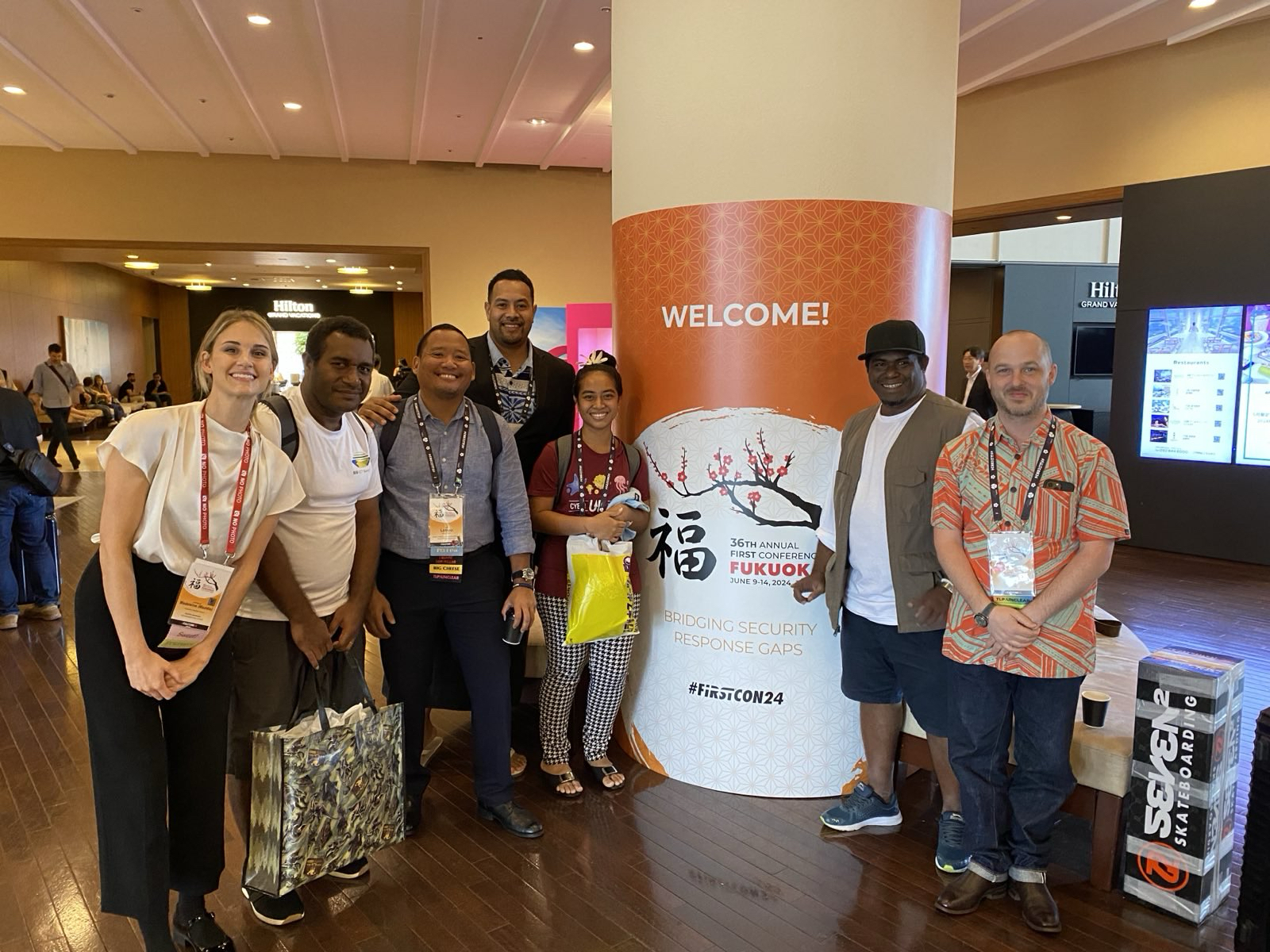In early June 2024, 8 PaCSON representatives travelled to Fukuoka, Japan to attend the Forum of Incident Response and Security Teams Annual Conference (FIRSTCON24). The conference was conducted over the course of 7 days and included networking opportunities, presentations and various workshops.
FIRST is a forum that promotes worldwide coordination and cooperation among computer security and incident
response teams. FIRSTCON24 facilitated the sharing of goals, ideas and information on how to improve cyber
security at an international level across the private and public sector. Through active participation and engagement
in conferences such as FIRSTCON24, international cyber experts including those from the Pacific, are strengthening
the resilience and capability of the global cyber landscape.
This was the second time a large delegation of PaCSON members was present at FIRSTCON. Networking and
information sharing opportunities at FIRSTCON24 facilitated greater international cyber cooperation among
attendees and across the Pacific region. PaCSON representatives were from: Kiribati, Palau, Papua New Guinea,
Solomon Islands, Tonga and Vanuatu. Evidently, the Pacific’s continued engagement has cemented their place as a
key international cyber experts, contributing to a safer and more secure cyber world.
Throughout the 7 day event, PaCSON representatives engaged in a variety of workshops and presentations. This
included presentations from Bhutan, New Zealand, Japan, Spain and England. One PaCSON representative from
Palau, Lebuu Gibbons, emphasised the importance of these presentations, particularly for the growing cyber teams
across the Pacific. Specifically, Gibbons noted “All presentations in my mind are case studies; how one country’s
dilemma becomes a learning curb and must be considered in a plan when formulating a CERT or just starting
off with a one-man team.”
All of the PaCSON representatives left FIRSTCON24 with critical skills and ideas to help improve their nation’s cyber
security. PaCSON representative Lenton Talota, from the Solomon Islands, captured this learning experience, stating
that “attending the conference was an invaluable experience”. Talota also noted that all the skills he acquired such
as “best practices and standards… incident response and management,” significantly improved his “ability to
contribute effectively to [his] organisation's cyber security efforts.” This shows that our PaCSON members have not
only used the conference to engage in cyber security uplift at a transnational level, but have each taken away
important lessons to implement within their own nation.
Some highlights include:
- Team PaCSON (Bongraoi Arebaio from Kiribati and Tim Myers from New Zealand) participating in the annual
FIRSTCON Capture the Flag competition. - Hamilton Vagi being selected to be the volunteer session chair for two presentations. Session chairs
introduce speakers, facilitate questions and ensure presentations run on time.
Presentations of note include: - BtCIRT (Bhutan) spoke about their experience using geolocation to their advantage from the initial stage of
setting up BtCIRT to now. - Spain and Japan made a joint presentation on tracing offenders to MO testing of theory, where holidays
coincide with an increase of traffic from offenders. - Presenters from England Bank spoke about how insider threats are to be handled (both malicious and
unintentional), in a way so as not to disrupt job environment. - CERTNZ presented their new marketing campaign, which saw an emphasis on the human side of cyber and
how it impacts individuals.
PaCSON eagerly awaits next year’s conference, FIRSTCON25, which will be held in Copenhagen, Denmark. In the
meantime, PaCSON representatives plan to implement their newly acquired knowledge and skills within their
respective organisations. Through continued development of our cyber security capabilities, the Pacific and broader
region will build cyber resilience to recover quickly from adversary attacks and to protect critical infrastructure.

